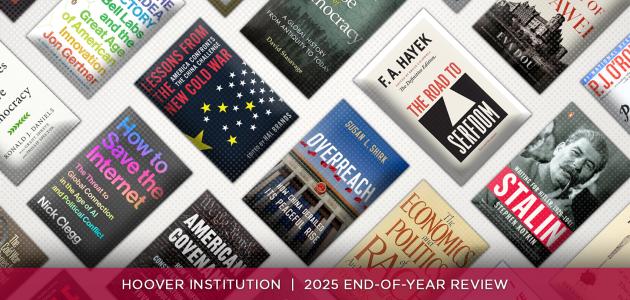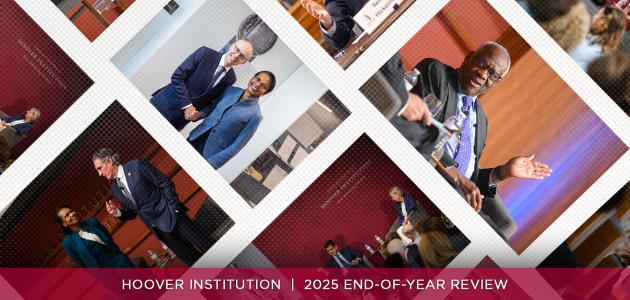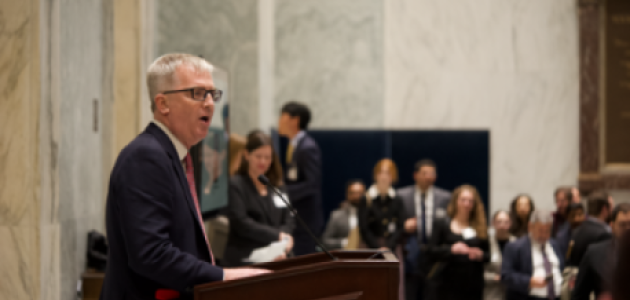STANFORD—The Hoover Institution’s Board of Overseers annual summer meeting featured the award-winning historian and author Michael Beschloss at its Dinner on the Quad on July 11. Beschloss addressed an audience of more than 1,000 guests in a speech based on his recent book, Presidential Courage: Brave Leaders and How They Changed America, 1789-1989.
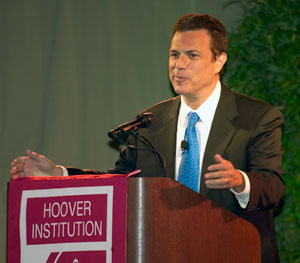
Michael Beschloss
Beschloss credits George Washington with setting the precedent for presidential courage. Washington, he said, supported the unpopular Jay Treaty with Britain, which angered his fellow citizens and led to him being ostracized by former supporters. Beschloss went on to say that Washington’s support of the Jay Treaty, which delayed war with Britain, allowed the newly formed U.S. to build its military strength so that should it go to war with Britain, which it did in 1812, the U.S. would be victorious. In taking this risk Washington was inventing presidential courage, Beschloss said. “The expectation is that future presidents in moments of crisis are expected, like the great Washington, to put themselves in jeopardy,” he explained.
He said the list of succeeding presidents who demonstrated that courage included John Adams, whose opposition to war with France cost him his re-election; Andrew Jackson, who stood up to the Bank of the United States; Harry Truman, whose support for creation of Israel was criticized; and Ronald Reagan, who found common ground with Soviet leader Mikhail Gorbachev despite opposition from hard-line anti-communists at the time. Beschloss ended by reminding the audience of Washington’s last words on his deathbed – “don’t be afraid.”
Other speakers at the July 10–12 board meeting discussed a variety of topics that included the growth of China’s economy and what it means for the United States, illegal immigration, the possible resurgence of the cold war, terrorism, and future wars.
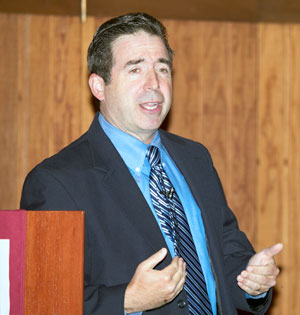
Russell Roberts
“If you want to make the world a better place, keep buying stuff made in China – free from guilt,” said Hoover research fellow Russell Roberts. In his presentation, “Robert Frost and the Chinese Economy: Is Chinese Growth Good for the United States?” Roberts noted that for economists, economics is not just observation of things; economists need to understand the connection between things. For example, trade with other countries means that some jobs in the United States are outsourced to China but the economist sees that new jobs in the U.S. are created as a result of trade, too.
Roberts questioned the view held by some that the increasing number of imports from China to the United States is detrimental to Americans. Purchasing products made in China can be beneficial to Chinese and American workers, Roberts said. When Americans buy products made in China, those purchases increase the demand for skilled Chinese workers and drive up their wages. There are opportunities for Americans, too, if you understand economics, Roberts said. For all the jobs that are lost, other jobs are created to replace them. The children of factory workers often go on to better paying jobs and more prosperous lives than their parents, he said.
Without trade, the quality of our lives would be dramatically worse, Roberts said. Those who view trade as dangerous, he said, “misunderstand the process of wealth creation and how China succeeds. Economic success is not like a race. China gets ahead by helping us.” To those who want to put up barriers to trade, he quoted the poem “Mending a Wall,” by Robert Frost, “Before I built a wall I'd ask to know/ What I was walling in or walling out/ And to whom I was like to give offense.”
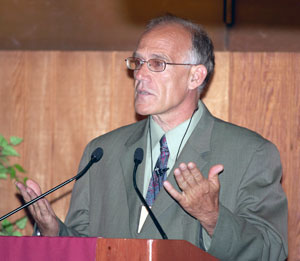
Victor Davis Hanson
The defeat of the recent immigration reform bill was the subject of Victor Davis Hanson’s talk titled “Illegal Immigration Legislation: Reform or Regression?” Hanson, the Martin and Illie Anderson Senior Fellow at the Hoover Institution, explained that reforming illegal immigration legislation has become an issue for several reasons. The first is that the sheer number of immigrants has made it an issue in communities that haven’t been forced to confront it before. Another is that all prior legislation has failed to address the problem. The unknown number of illegal immigrants makes it difficult to quantify the issue, Hanson said, as well as competing groups that have different vested interests. It was in the midst of all the aforementioned that the immigration reform bill collapsed, he said.
Hanson suggested that probably the easiest and best way to deal with illegal immigration is to close the border, which could be done through a 750-mile fence, improved border security, fining employers for hiring illegal aliens, and issuing verifiable identification for workers who are not citizens. Stopping the flow of illegal immigration between the United States and Mexico would benefit both countries. In light of problems with past legislation in 1965 and 1986, Hanson concluded by saying that “the worst possible thing we can do is rush through a piece of legislation.”
In his presentation, “Is the Cold War Back? Russia’s Authoritarian Drift and U.S. - Russia Relations,” Michael McFaul said that “Russia today is a dictatorship.” McFaul, the Peter and Helen Bing Senior Fellow at the Hoover Institution, noted that Russia has experienced a significant economic recovery but disputed the idea of associating that recovery with the growing autocracy. Instead, he said, it could be attributed to a sound economic policy. Until Soviet president Vladimir Putin, McFaul said, “the basic intent of Russian leaders was integration into the West and to develop markets, democratic institutions.”
McFaul concluded that the Cold War will not resume because there is no longer an ideological component driving the competition between the two countries. McFaul remains concerned, though, at the corruption and loss of institutions that support democracy, such as media, in Russia.
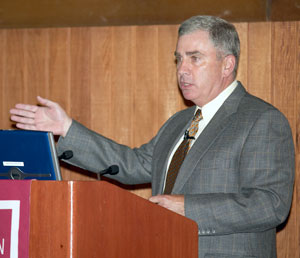
General (ret.) John Abizaid
General John P. Abizaid (ret.), Hoover Annenberg distinguished visiting fellow, and Colonel H. R. McMaster, Hoover research fellow, discussed dealing with terrorism and future wars.
The focus of Abizaid’s presentation, “Discussions on the Long War,” was on the Middle East. Abizaid discussed his views of the region, the problems there, the challenges ahead, and the optimism he has for a U.S.-led effort that leaves the region a better place. “The alternative to shaping the region,” he added, “could be our worst nightmare.”
Issues that the United States must deal with in the region are numerous, according to Abizaid. They include defeating al-Qaeda and its associated movements, containing Iran and Shia extremism, gaining positive momentum on broader Arab-Israeli peace issues, preventing Sunni-Shia violence from becoming the defining conflict in the region, empowering secular and moderate power centers against the growing wave of extremism, and preserving the flow of strategic resources from the region.
Abizaid believes the first priority is stabilizing Iraq; second, contesting the safe haven for terrorists in Pakistan on the Afghan-Pakistan border; the third, stabilizing Afghanistan; the fourth, working with the Israelis; and the fifth, not allowing the Horn of Africa to become the next safe haven for terrorists. “Patience, perseverance, and steady engagement must be employed over time,” said Abizaid. “I am very optimistic about our ability to shape the future of the region.”
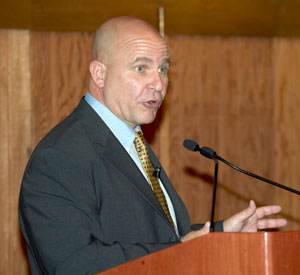
Col. H.R. McMaster
McMaster, quoting the Prussian military officer and scholar Carl von Clausewitz, said “that war should never be thought of as something autonomous but always as an instrument of policy.” McMaster went on to say that Clausewitz believed that it was imperative, at the beginning of conflict, for statesmen to establish the kind of war on which they were embarking. “Understanding the nature of future war is becoming increasingly difficult as we confront multiple sources of violence,” McMaster said in his presentation, “The Problem of Future War: What Can We Learn from History and Contemporary Conflicts?”
McMaster cautioned against considering terrorism as merely a law enforcement, homeland defense, or intelligence problem. Such views, he said, fail “to address the causes of terrorism and to consider terrorist organizations’ sources of strength and support.” The principal lesson from the current conflicts in Iraq, Iran, and southern Lebanon may be that military campaigns must be part of a larger strategy that integrates political, military, diplomatic, economic, and informational efforts to achieve clearly defined goals.









